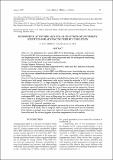| dc.description.abstract | Objective: To determine the current HIV/AIDS Knowledge, Attitudes and Sexual Practices (KASP) indicators among university students that would facilitate development and implementation of a peer education programme and the subsequent monitoring and evaluation of other HIV/AIDS activities.
Design: An institutional based cross-sectional study.
Setting: Maseno University, Kenya.
Subjects: Five hundred students composed of 60% males and 40% females as dictated by the university’s male to female ratio.
Main outcome measures: Levels of HIV and AIDS awareness, knowledge and attitudes and the current related behavioural trends and tendencies, among the students at the University.
Results: Of the five hundred respondents included in the study, 68.5% of them reported having ever had sexual intercourse, with males being the majority at 78.2%, while the females were 54.7%. A large majority (77%) of females were in current sexual relationships compared to 66.7% of males. A significant proportion (54.8%) of first year students reported having had their first sexual intercourse at the university. Sexual
activity was seen to increase from 56.9 to 71.2% among the first year students when they got to second year of study at the university. Peer pressure emerged as an important factor in students’ sexual behaviour (P=0.001). Of the students, 32% reported having undergone HIV tests, 70.8% were willing to go for a test while 74.3% perceived they
had a chance of being infected with the virus based on their previous risky sexual experiences. A significant 77.7% of the respondents affirmed having ever used condoms but only 15.8% reported consistent use.
Conclusion: High proportions of students are sexually active with peaks in first and second years of study. This is coupled with an equal inconsistent use of condoms. Peer influence emerged as an important feature in accelerating risky sexual behaviour hence the need for advancing peer education programmes in universities. | en_US |

